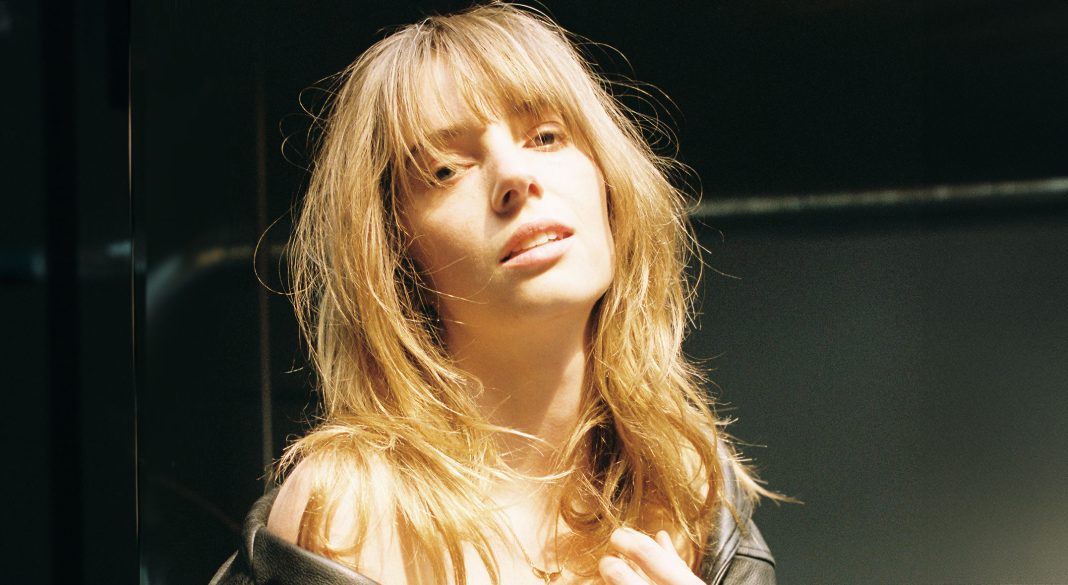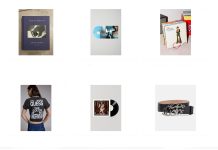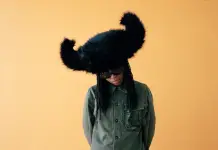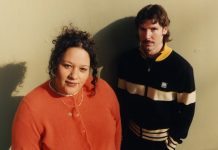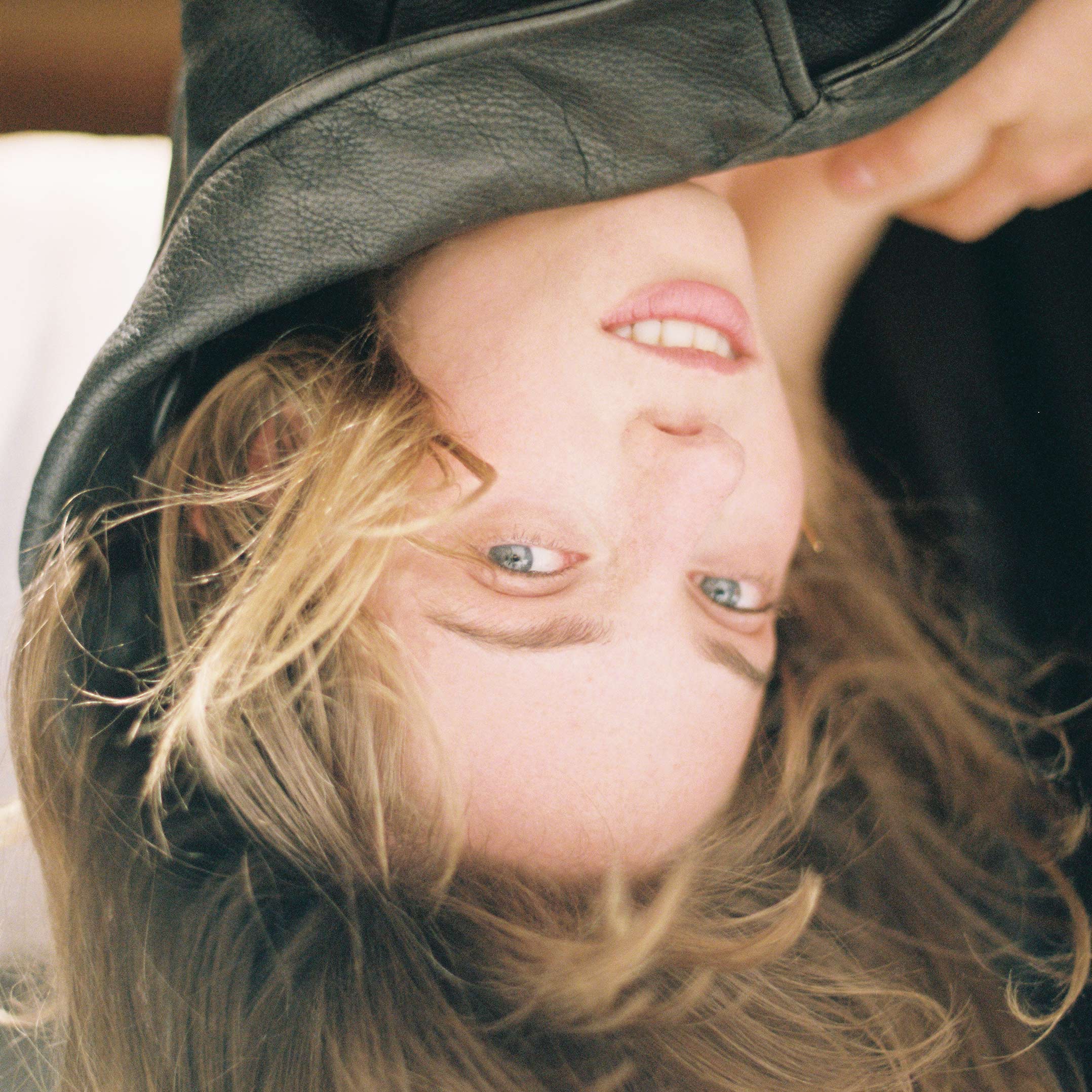
Maya Hawke
When she’s not battling demogorgons, Maya Hawke pens melancholic, soul-searching indie-folk. Three albums in, she’s unpicking and reframing her past relationships – and being a little kinder to herself in the process.
Words: Rhian Daly. Photos: Andrew Lyman
Maya Hawke is sitting on her porch in Atlanta, Georgia, painting in the morning sun. As birds sing and chirp behind her, it seems like an idyllic start to her day off – a rare moment to catch her breath between filming the fifth and final season of Stranger Things. “You’re lucky,” she says dryly as The Forty-Five comments on her surroundings. “The last interview I did, they heard the sound of someone else’s weed whacker.”
The 25-year-old musician and actor has been having a busy time of late, not just because of the little Netflix hit that introduced her to the world. When we speak, she’s preparing to release her third album, ‘Chaos Angel’, her most accomplished and exciting album yet. The record takes the building blocks of her folky first two albums, ‘Blush’ and ‘Moss’, and levels up, showcasing new songwriting strengths and fresh facets of who she is as an artist.
Hawke came up with the idea for the album’s title when she was working on her latest movie, Wildcat. Directed by her dad, Ethan, the movie tells the story of writer Flannery O’Connor, played by Hawke. “The thing that inspired me was this one line where Flannery O’Connor describes herself fighting with her guardian angel and that she would punch at it,” she explains. “That really got me thinking about the way we all do that. You can call it a lot of things – your instincts, your gut, your guardian angel – but we all know what it is. It’s the voice in our head that says, ‘You need to have that next drink’ or ‘Maybe this relationship isn’t good for you’. This record is my talking to that voice and reflecting on experiences I’ve had where I didn’t listen and fought with it.”
As she pondered that idea, Hawke also wondered about how having bad instincts might impact the imaginary angel trying to guide you on the right path. Soon, she had conjured up the record’s titular character – a Cupid-style cherub who was meant to spread love but, despite her best intentions, leaves pure chaos in her wake. “Bad things can happen to you, in your childhood or whatever time in your life, and knock your instincts off course,” she reasons. “What if I could personify my sick angel and talk to her and say, ‘You’re OK, you just got a little confused about what your job is’? What if I could communicate with my instincts and therefore help heal them so that, when I do hear a voice in my head, I can trust it?”
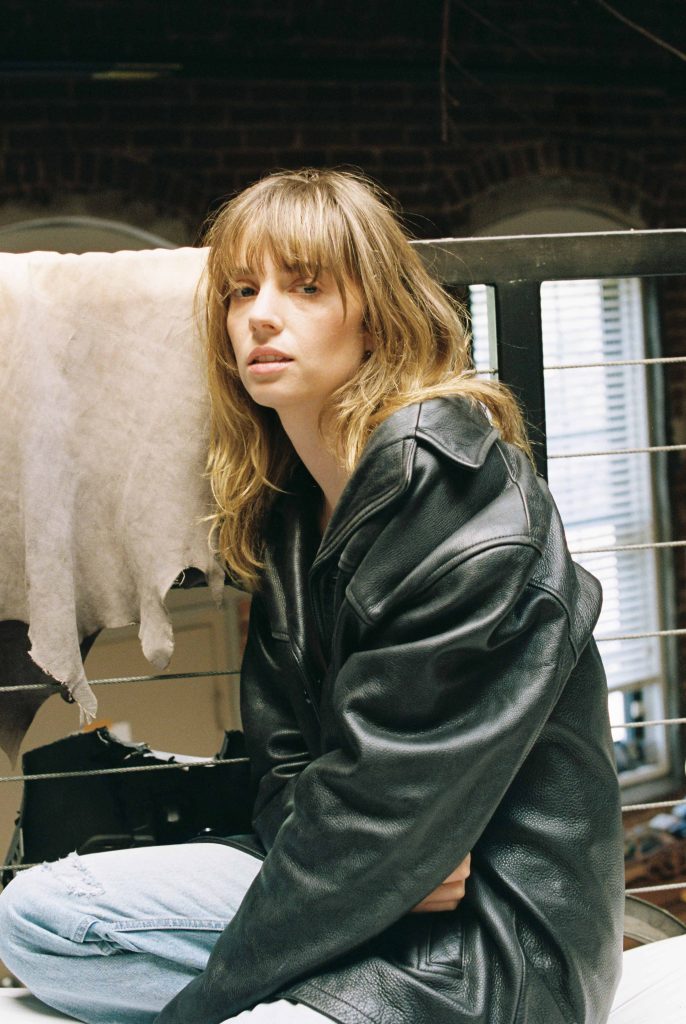
The chaos angel’s story ends happily. In Hawke’s narrative, the character is convinced that she’s destroyed all the things she was trying to make beautiful, but when she retraces her steps, she finds the opposite to be true. Since she crashed through the path, goodness has sprung up and is in full bloom. That conclusion, the star says, is reflective of something she realised about her habits in her love life.
“I went through a period of time of having an extreme amount of regret over my behaviour and romantic relationships – I hadn’t been in a relationship that lasted longer than a year, and I was in a state of serial monogamy,” she shares. Whenever one partnership ended, she’d quickly enter a new one: “I had this joke that the relationship was never the problem, but breaking up was always the cure – I would get this rush of freedom and then immediately try to tie myself down to something else.” She describes it as a pendulum swinging between two desires – to be free and to be safe – it lurching to whatever was the opposite of the situation she was in at the time.
When the artist freed herself from that vicious cycle, she felt “a lot of self-hatred” for the way she had previously behaved. But, like her chaos angel, she realised things weren’t as bad as she first thought. “I didn’t have a long list of people that hated me or wouldn’t pick up my calls,” she says. “I had friends, actually, and people who we’d worked through our experience together and moved into a friendship. That was so beautiful, and I valued it so much – in my opinion, friendship is the highest [kind] of relationship. It’s people that choose to be around you, not because you can provide them with a home or sex or whatever, but they just love you.”
In my opinion, friendship is the highest kind of relationship. It’s people that choose to be around you, not because you can provide them with a home or sex or whatever – they just love you
Maya Hawke
At its core, ‘Chaos Angel’ is a record about relationships, with Hawke studying her connections to her personal connections and the world around her. The songs are linked by a mantra that only makes itself clear at the album’s end in the title track when she sings, “I want you / I love you / I promise / I’m sorry” over tumbling piano, representing the romantic pattern she had been moving in. Those words and the feelings contained within them are dotted through the rest of the songs that come before the finale. “I feel like the rest of the record is an invitation to figure out how to break the cycle,” Hawke suggests, noting that the album ends on the line “I love you” – proof that she’s emancipated herself from another repeat performance.
It isn’t just love that Hawke is reflecting on with her third album, but other aspects of her life, too. We might not often think of those in the public eye – particularly those who’ve entered the spotlight in their youth – as missing out on much. But, while the young star is grateful for all her chosen career has brought her so early, she couldn’t help but wonder what adolescent rites of passage she had skipped by following her path. The college experience loomed large in those thoughts, but, luckily, her brother Levon was attending New York Ivy League school Brown, and she began to spend time with him and his friends there, trying to fill that gap.
“Everyone said to me that the thing to fear about not doing college was not putting in the time with your own generation, not getting to meet the people who will be there,” Hawke explains. “It’s just four years and then they’re going to graduate and all be friends, and you’re going to have been this weird freak hanging out with 40-year-olds.” Her time on campus made her realise she was right; she had missed out, but it also helped her learn to love the direction she had gone in life. “When I first was hanging out there, I would cry in conversations about whether or not the SAT was a good judge of intelligence. By the end, I was like, ‘Maybe it is, maybe it’s not – it’s not my kind of intelligence, and I’m OK with my life’. That was a big transition for me.”
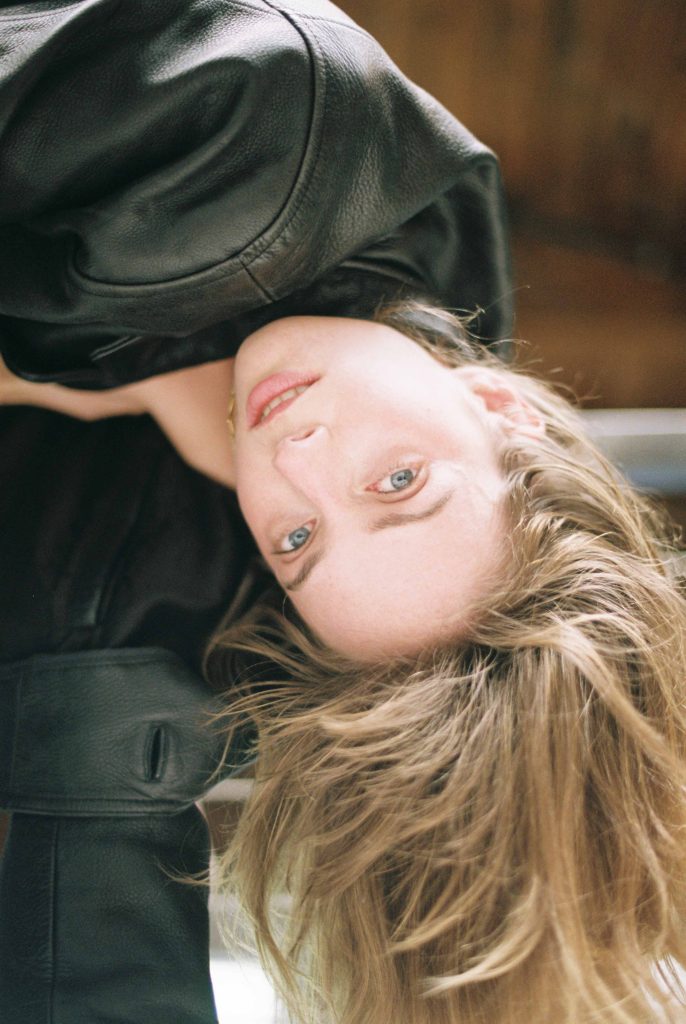
Her college catch-up is captured on the fittingly titled ‘Missing Out’, a lilting folk-pop piece that’s as wry as it is infectious. At one point, she assesses of herself, “I’ve been someone to talk about / I want to be someone to talk to,” a lyric she says is about being seen as her perceived public persona rather than as a persona, but has more relatable layers for those of us not in the public eye. “In a normal way, if you have some chaotic relationships, you’re likely going to get gossiped about,” she explains. “That never feels good because no one ever understands your point of view. Just in my community, I’d rather be someone to talk to and confide in, be trustworthy and be seen as a good friend and a good secret keeper.”
‘Chaos Angel’ is both a testament to and document of growth like that in many areas of Hawke’s life, including in her songwriting. Where her previous two records found her writing in a more guarded lyrical style, hiding her meaning behind metaphors and poetic turns of phrase, here she’s much more direct. On the slow swoon of ‘Okay’, she strips back her words to largely just two lines – “If you’re okay / Then I’m okay”. This change, in her mind, comes from shifting her inspirations.
“I was extremely inspired – and still am – by poets like Emily Dickinson, Edna St Vincent Malay and Coleridge,” she says. “These people wrote in really elaborate language. I mean, Emily didn’t, but sometimes it’s hard to understand what she’s talking about. I think I was honing in on what was most like if I were to paint a picture of how I was feeling and then write a poem about the picture and then write a song based on the poem – these levels of removal that can bring you to a wider metaphoric wisdom.”
Now, though, she acknowledges, adding in all those layers can sometimes have an adverse effect, breaking “the chain of intimacy between you and your listener”. “A song is such an extraordinary communication tool that you don’t need to add that much more to it. You can say, ‘I want you, I love you’ – on the written page, that’s not much of a poem, but if put to music in the right way, it can almost be a new idea.”
Hawke has evolved musically, too. While most people would have classed her as a musician long ago, this album is the first time she says she’s actually felt like one rather than just “a poet in a band”. She credits that transformation in her thinking to Christian Lee Hutson, the album’s producer and one member of the tight-knit circle of collaborators she’s been building since ‘Blush’. “He really encouraged me to include my own writing in it,” she explains. “There’s a bunch of melodies in the record that I wrote, so I think I feel more agency over it in that way.”
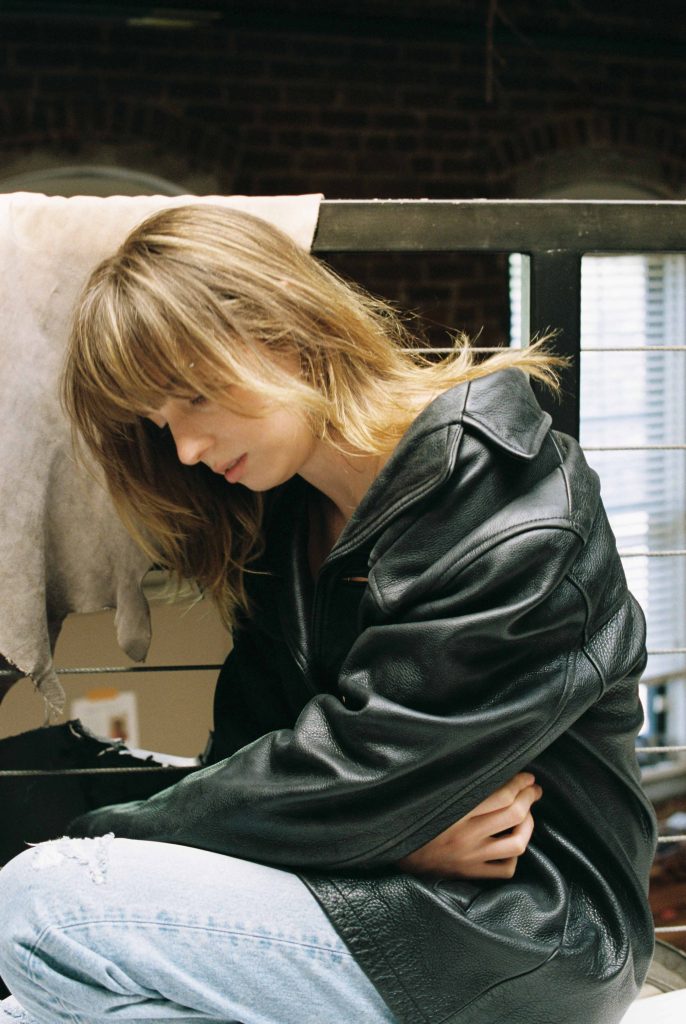
One of those melodies is on the title track. Hutson heard it when Hawke was walking around her house singing it and asked her what it was. She told him it was “just this thing I’ve been working on” and that she needed to give him and their fellow cohorts the lyrics so they could come up with some new music to go with them. “He was like, ‘We don’t need new music – that’s great’,” she recalls. “It was through his encouragement that I started to put my own music on this record.”
Now she feels more comfortable mastering her own melodies, Hawke has chords in her crosshairs next. “I know all the basics, but I don’t know an interesting, cool, new way to play G,” she smiles. “I don’t feel like I have the command to express myself emotionally through chords yet.” When The Forty-Five points out that many amazing songs are built from the simplest of chords, she hurriedly agrees: “Most of my favourite songs have the chords I write with. But there are different emotional connotations to all different chords, and I get very excited figuring out what the chords are going to be and how the phrasing of them is going to operate.”
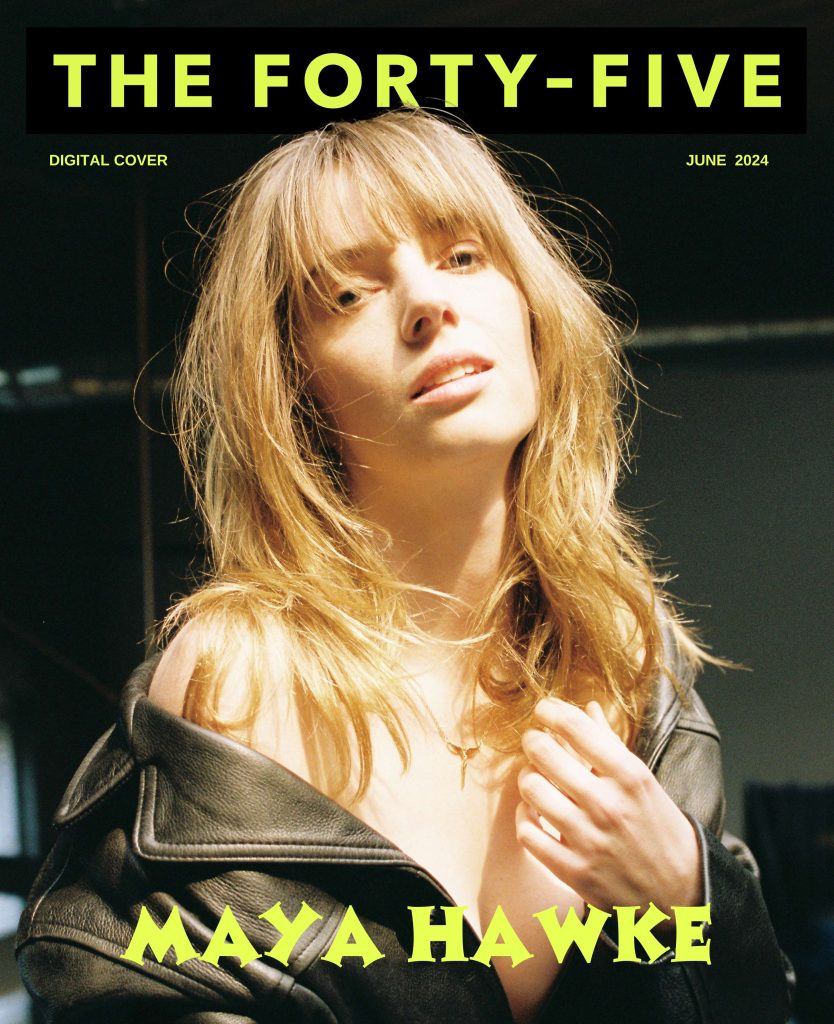
Talking to Hawke, excitement is an emotion that you sense is a frequent presence in her life. She waxes lyrical about everything from the intricacies of her music to her still-held fantasy of one day being considered legitimate enough to be an acting teacher to the intersection of her acting and music careers and how each feeds the other. After a moment’s thought, she says she can see things she’s learnt through playing Robin in Stranger Things in this album of growth and acceptance.
“Through playing parts, I’ve grown to discover more parts of myself – I’m not exactly like Robin, but there are parts of me that are a lot like her,” she reasons. “Playing her helped me explore those parts, come to accept them and find grace for them in me, like the part of me that can’t stop talking and the part of me that has had massive periods of confusion and revelry over the exploration of my sexuality, parts of me that are sarcastic and discreet and uncoordinated. I grew to have love for those parts and to explore them further for her benefit and, therefore, for my benefit as well. There’s tons of that in the record.”
Considering that character has clearly had a big impact on her over the years, how is she feeling about saying goodbye to her after finishing this upcoming season of Stranger Things? “It won’t be a goodbye,” Hawke replies. “The experience of being on a show like that is once-in-a-lifetime. I think it helps people, gives them joy, heroes, and people to look up to and see themselves in. I will be talking to people about that character and experience for the rest of my life. It’s very sad to say goodbye to my co-workers, but that character will be with me forever.”
The experience of being on a show like Stranger Things is once-in-a-lifetime. I think it helps people, gives them joy, heroes, and people to look up to and see themselves in
Maya Hawke
As she talks, the red paintbrush Hawke has been creating something with off-screen bobs about the screen. As our time together comes to an end, she lifts up the rectangle she’s been dabbing at to show us her work. On it, is a blue-green sky that softly changes hue the further to the edges it goes, black trees and stick figures etched along the bottom of the card. It’s pretty and intriguing – the light from its brightest patch emanating outwards as if pulling the rest of the scene out of darkness, just like ‘Chaos Angel’.
Chaos Angel is out now via Mom + Pop Records.


